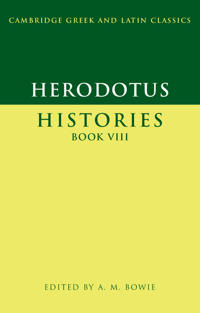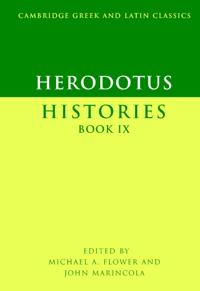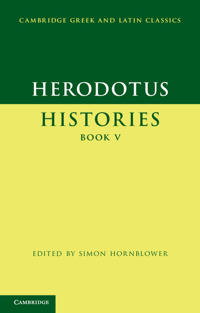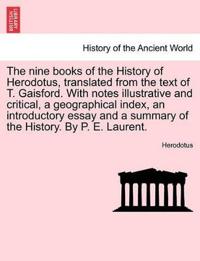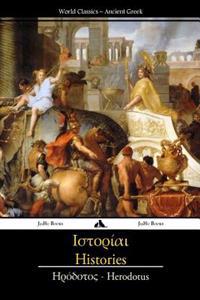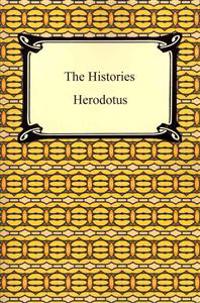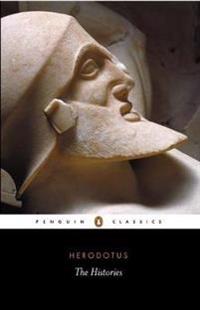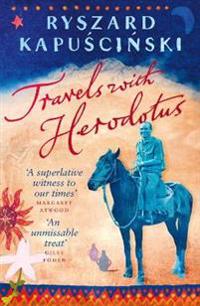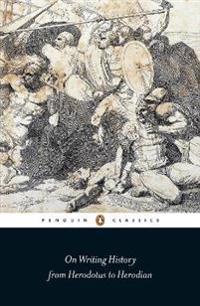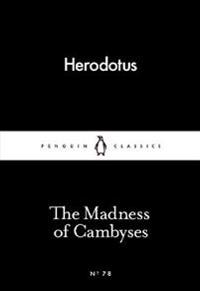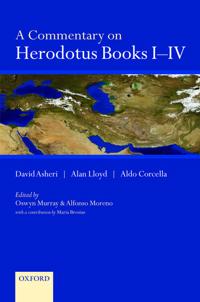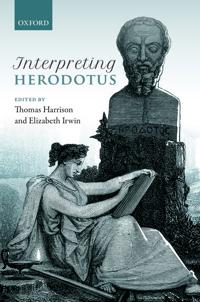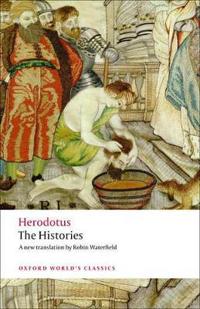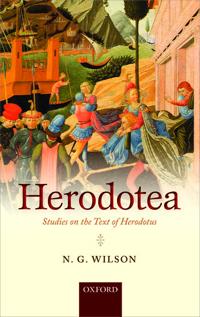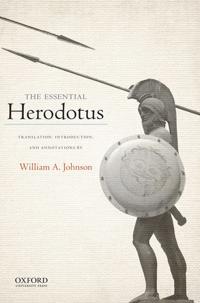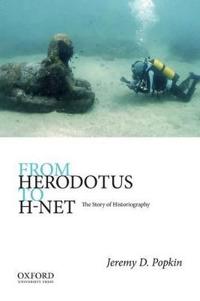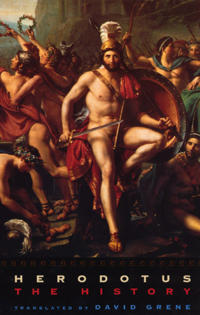Herodotus: Histories Book VIII (Häftad)
avHerodotus
ISBN: 9780521575713 - UTGIVEN: 200712The Battle of Salamis was the first great (and unexpected) victory of the Greeks over the Persian forces under Xerxes, whose defeat had important consequences for the subsequent history and self-image of Europe. This battle forms the centre-piece of book VIII of Herodotus' Histories. The book also i[...]
Herodotus: Histories Book IX (Häftad)
avHerodotus
ISBN: 9780521596503 - UTGIVEN: 2002-12Book IX of Herodotus' Histories provides the conclusion and climax to his work, as the victories at Plataea and Mycale complete the improbable Greek victory over Persia. The major themes of the work are all here echoed, modified, and revisited, and Book IX is thus essential for exploring its meaning[...]
Herodotus: Histories Book V (Häftad)
avHerodotus
ISBN: 9780521703406 - UTGIVEN: 2013-11One of the most important works of history in Western literature, by the freshest and liveliest of all classical Greek prose authors, Herodotus's Histories is also a key text for the study of ancient Greece and the Persian Empire. Covering a central and widely studied period of Greek history, Book V[...]
The Nine Books of the History of Herodotus, Translated from the Text of T. Gaisford. with Notes Illustrative and Critical, a Geographical Index, an Introductory Essay and a Summary of the History. by P. E. Laurent. (Häftad)
avHerodotus
ISBN: 9781241449636 - UTGIVEN: 2011-03Title: The nine books of the History of Herodotus, translated from the text of ... T. Gaisford. With notes illustrative and critical, a geographical index, an introductory essay and a summary of the History. By P. E. Laurent.Publisher: British Library, Historical Print EditionsThe British Library is[...]
The Histories (Pocket)
avHerodotus, George (TRN) Rawlinson, Herodotus
ISBN: 9781420933055 - UTGIVEN: 2009-01The Histories (Storpocket)
avHerodotus
ISBN: 9780140449082 - UTGIVEN: 200301One of the masterpieces of classical literature, the "Histories" describes how a small and quarrelsome band of Greek city states united to repel the might of the Persian empire. But while this epic struggle forms the core of his work, Herodotus' natural curiosity frequently gives rise to colorful di[...]
The Histories (Häftad)
avHerodotus
ISBN: 9780140455397 - UTGIVEN: 2014-09Tom Holland's 'stirring new translation' (Telegraph) of Herodotus' Histories, one of the great books in Western history - now in paperback. The Histories of Herodotus, completed in the second half of the 5th century BC, is generally regarded as the first work of history and the first great masterpie[...]
Travels with Herodotus (Storpocket)
avRyszard Kapuscinski
ISBN: 9780141021140 - UTGIVEN: 200805"Travels with Herodotus" records how Kapuscinski set out on his first forays - to India, China and Africa - with the great Greek historian constantly in his pocket. He sees Louis Armstrong in Khartoum, visits Dar-es-Salaam, arrives in Algiers in time for a coup when nothing seems to happen (but he s[...]
On Writing History from Herodotus to Herodian (häftad)
ISBN: 9780141393575 - UTGIVEN: 2018-03What is history and how should it be written? An important new anthology containing the seminal texts on the writing of history in the ancient world
The study of history was invented in the ancient world. Treading uncharted waters, writers such as Plutarch and Lucian grappled with big questi[...]The Madness of Cambyses (Häftad)
avHerodotus
ISBN: 9780141398778 - UTGIVEN: 2015-02'Do you see your son, standing over there, in the antechamber? Well, I am going to shoot him.' The story of the great and mad Cambyses, King of Persia, told by part-historian, part-mythmaker Herodotus of Halicarnassus. Introducing Little Black Classics: 80 books for Penguin's 80th birthday. Little B[...]
The Histories (Häftad)
avHerodotus, Paul Cartledge
ISBN: 9780143107545 - UTGIVEN: 2015-05Unquestionably the best English translation of Herodotus to have appearedin the past half-century. "The Times Literary Supplement"
In Tom Holland s vibrant translation, one of the great masterpieces of Western history springs to life. Herodotus of Halicarnassus hailed by Cicero as the Father of [...]A Commentary on Herodotus (Inbunden)
avDavid Asheri, Alan Lloyd, Aldo Corcella
ISBN: 9780198149569 - UTGIVEN: 200708Herodotus, one of the earliest and greatest of Western prose authors, set out in the late fifth century BC to describe the world as he knew it - its peoples and their achievements, together with the causes and course of the great wars that brought the Greek cities into conflict with the empires of t[...]
Divinity and History: The Religion of Herodotus (Inbunden)
avThomas Harrison
ISBN: 9780198152910 - UTGIVEN: 2000-07-13Interpreting Herodotus
ISBN: 9780198803614 - UTGIVEN: 2018-03Developing the themes and ideas of Charles W. Fornara's seminal publication Herodotus: An Interpretative Essay (Oxford, 1971), this volume offers a new look at the Histories in light of the explosion of scholarship in the intervening years, focusing particularly on how we can interpret Herodotus' wo[...]
Motivation and Narrative in Herodotus (Inbunden)
avEmily Baragwanath
ISBN: 9780199231294 - UTGIVEN: 2008-05-15The Histories (Häftad)
avHerodotus
ISBN: 9780199535668 - UTGIVEN: 200804Herodotus is not only known as the 'father of history', as Cicero called him, but also the father of ethnography; as well as charting the historical background to the Persian Wars, his curiosity also prompts frequent digression on the cultures of the peoples he introduces. While much of the informat[...]
Herodotus (Pocket)
avJennifer Tolbert Roberts
ISBN: 9780199575992 - UTGIVEN: 2011-06-23Jennifer Roberts introduces the background and writing of the 5th century Greek thinker and researcher Herodotus of Halicarnassus, who invented the genre of historical investigation. She discusses all aspects of his work, including his fascination with his origins; his travels; his interest in seein[...]
Herodotus
ISBN: 9780199587575 - UTGIVEN: 2013-10Herodotus' Histories is a fascinating account of the interactions between the Greeks and their powerful Near-Eastern neighbours. In it he explores the long-term causes for the Persian invasions of Greece in the early fifth century BCE, a momentous event both for the development of Greek civilization[...]
Herodotea: Studies on the Text of Herodotus
ISBN: 9780199672868 - UTGIVEN: 2015-10Although it is often thought that Herodotus is a simple author, and that his Histories do not contain many passages requiring textual criticism, closer investigation reveals this view to be inaccurate. Written to accompany and augment the new Oxford Classical Texts edition of the Histories - which h[...]
The Essential Herodotus (häftad)
ISBN: 9780199897957 - UTGIVEN: 2016-08The Essential Herodotus breathes new life into the writings of the West's first historian, interleaving succinct commentary and notes with balanced selections of Herodotus's work. William A. Johnson's clear and lively translations lead the reader through complex materials, making the text accessible[...]
From Herodotus to H-net
ISBN: 9780199923007 - UTGIVEN: 2015-08From Herodotus to H-Net: The Story of Historiography offers a concise but comprehensive and up-to-date account of the many ways history has been studied and recounted, from the ancient world to the new universe of the Internet. Clearly written and organized, it shows how the same issues that histor[...]
The History (Pocket)
avHerodotus, David Grene, David Grene
ISBN: 9780226327723 - UTGIVEN: 198801David Grene, one of the best known translators of the Greek classics, splendidly captures the peculiar quality of Herodotus, the father of history.
Here is the historian, investigating and judging what he has seen, heard, and read, and seeking out the true causes and consequences of the [...]Herodotus
ISBN: 9780300072303 - UTGIVEN: 1998-12Herodotus, widely known as the father of history, was not only a historian but also a master story-teller, argues the author of this insightful book. James Romm gives general readers a fresh appreciation of the Histories and shows that Herodotus was more than a source of historical data-he was a mas[...]

